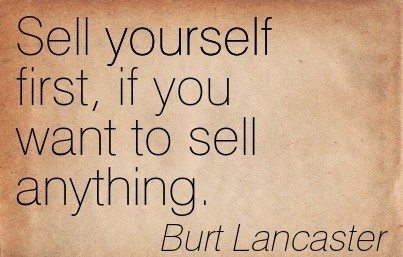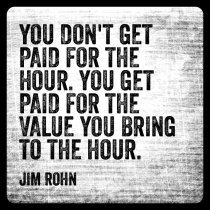Life
The Secret Formula Behind Mega-Successful Job Applicants

As entrepreneurs, we’re not always able to dive head first into our businesses. Often times, we have to spend months (or years) building our business on the side before we can take the plunge and go full-time out on our own.
But just because our day job isn’t what we plan on doing for the rest of our life…doesn’t mean we should settle for less in our careers.
In fact, you can use your work-for-someone-else career to catapult your work-for-yourself on, if you apply some little know (but ULTRA powerful) techniques to finding a dream job.
Learn how you can escape the 9-5 grind and find a career you love below…
Have you ever wondered what separates highly sought-after career candidates (those individuals whose inboxes are drowning in endless job offers…the people employers are begging to join their ranks) from the millions of people who click submit, again and again, responding to job board ads and spraying the web with their resumes, feeling like it’s instantly lost in some sort of black hole?
If so, you’re not alone.
Every day, thousands of people are frustrated by the fact that they’re forced to settle in their careers. Instead of doing what they want, they’re doing what they have to do to get by.
The jobs they’re working in lack challenge, meaning, and growth.
“Learn before you earn!”
They desperately want to have an impact, to use the hard-fought knowledge they spent years in school learning, and to be fulfilled by their day-to-day tasks…instead of dreading Monday mornings and (finally) breathing a huge sigh of relief every Friday at 5 pm when they can head home.
And when these same folks imagine working in their current role for the next 40 years of their lives, they feel a crushing weight bearing down on them and see nothing but darkness and gloom ahead.
The only bright spots in their minds are short spurts of travel on vacations—that is IF (and that’s a big “if” by the way) they can muster up the courage to ask their boss for time off—and, of course, there’s always the weekends…
I know the feeling because I had these same thoughts.
I was a fast-food working, college student with no connections or relevant experience in the career field I desperately wanted to be in: investment banking.
I hated my job and had no prospect of ever escaping mediocrity. When I thought of my future, burgers and fries were all I could clearly see.
Every job I wanted required years of experience, but how was I supposed to get my foot in the door to gain experience if I had to have experience to even make it to the door in the first place?
While I was pulling my hair out in frustration, I watched mega-successful job applicants skip light-years ahead in their careers (without the pre-requisite experience…and without having gone to top universities around the globe).
I saw those same people handpick the companies they wanted to work for (being selective…instead of just taking any job that came their way).
And most impressive of all, I looked on in awe as those people negotiated thousands of dollars in pay raises (essentially setting their own salary and getting paid what they deserved) instead of just jumping at the first number the hiring manager threw their way.)
What was their secret?
If you asked the “average Jane/Joe” or supposed “career expert” off the street, they’d say something generic like:
- The best candidates have a LinkedIn profile and clean social media sites…
- Their resume has 12pt font and an objective statement tailored to that company…
- Successful applicants normally have stacks of business cards on hand—just in case they meet someone who wants to hire them…on the spot! (Hey, you never know when chance will strike, right?!)
Yeah, right. None of those things are the real reason.
You and I know there’s something much different causing this disparity.
Of course, your social media profiles shouldn’t have pictures of you doing keg-stands or rants about how much you’re bored at your current job (and how you’re on Pinterest all day…when you should be working).
And of course, your resume needs to be well designed and specific to that job’s requirements.
But there are plenty of people with perfectly polished resumes, stacks of unused business cards and clean social media profiles that never even get a call back.
What is it that the best career candidates know and do that nobody else does…so they don’t spend time fighting over the scraps? And how do they consistently get first dibs on the jobs they REALLY want?
The secret lies behind the scenes with the subtle art of salesmanship.
Yep, you read that right. The best way to uncover a career that’s right for you and finally find your dream job is to employ some elusive but oh-so powerful tactics of master salespeople.
We’re not talking hair-slicked back, used-car salesman techniques here.
We’re talking about timeless tactics you can trace all the way back to ancient Rome, where dudes in togas were earning fortunes by mastering the art and science of selling.
Because here’s the truth: when you’re looking for and applying to jobs, what you’re really doing is selling yourself.

It’s selling them on a vision that you are worth investing in, and you can get the job done… better than anybody else who comes through the door.
It wasn’t until I uncovered some very powerful lessons in salesmanship that I was able to turn my sinking career ship around, bring it back afloat, and land safely on the shores of career success (I did eventually get that job at an investment bank).
You can do the same—no matter where you are on the career-seeking spectrum.
So enough suspense, let’s dive right in to the 3 sales tactics you can use to snag your dream job.
1. Build your network before you need it.
There’s nothing worse than a desperate salesperson. You feel icky when you’re in their presence. When they look at you, you’re not sure if they see dollar signs or an actual person, and that happens because they haven’t spent the time building out their network before they need it.
They’re leading with a pitch, trying to bang you over the head to make a quick sale…and that just wreaks of hopelessness and being needy. You avoid these salespeople like the plague.
On the other hand, successful salespeople know they need to authentically connect with people and add value first, before they ever ask for anything.
Nobody likes to feel sold right away. The same thing applies to your career.
If you’re out networking and meeting new people, the last thing you want to do is lead with your interest in working for them. First, focus on making an authentic connection, then find ways in which you can help them.
The great thing is you can add value in so many different ways.
For example, you could write a testimonial for their business or products, you could share their ideas on social media sites, you could comment on their personal blog (if they have one), you could recommend a great person for a position they might be hiring for immediately, you could even just try some of their advice (and follow up with them, telling them how it went)—no matter what you do, always lead with adding value first.)
Very few people do this. But when you do, you’ll stand out in their minds and rise to the top of any resume stack when a position opens up.

2. Find your niche
Do you know how you can tell a successful, veteran salesperson from a raw, inexperienced rookie?
One way is that the rookie will try to sell to anyone and everyone, multiple times a day. Whereas, the seasoned salesperson will take a much more targeted approach.
In fact, veterans will actively turn some people away, knowing their time is better spent elsewhere.
If you think about the way most people go after a job, they are very haphazard in their approach. Like rookie salespeople, they’re reaching out, trying to grab any and every job they can.
If you were to ask them what kind of job they’re looking for, they’d respond with something like “I want a job that challenges me… and rewards me for hard work. I want to be passionate and part of a team that makes an impact.”
In reality, that doesn’t mean anything—that could literally be any job.
Instead of this generic approach, you can rip a page out of elite salespeople’s book and get very specific with the type of career you want—developing your own target market for a career, so to speak.
So instead of vague comments about an ideal job, you want to get ULTRA-specific. On paper that might look like this:
“An entry level position in business development in the NYC area”
Or
“A mid-level position as a product marketing manager in San Francisco at a startup company.”
When you get specific like this, you can eliminate dead-weight career distractions and take a highly targeted approach to finding your dream job.
Rather than sifting through endless lists on job boards, you’ll know the few companies you should be focusing on and have laser-guided focus on where you want to go.
This is how salespeople develop huge client bases in niche markets–by targeting a narrow range.
You can do the same for your career and get 10 times the results of guesswork and randomly applying to anything that comes your way.
3. Uncover hidden pain
What’s the most important part of any sale?
If you guessed the close, you’re skipping way to far ahead. You’ll never even get a chance to close someone without the first (and most important) part of any sale: creating or uncovering pain.
Top performing salespeople know that’s the case. That’s why you’ll never see them leading with a pitch out of the gate. They always start with questions to uncover the hopes, fears and dreams of the prospect.
You can employ this same technique to your career search.
To do that, you’ll need to spend time researching where the companies that you’re interested in are experiencing some pain, and then paint the picture that you are the one who can solve their issues.
For example, maybe HR is a struggle for them, or consistently closing sales deals, or maybe it’s simply that their site isn’t converting the way it should…whatever the case, every company has some hidden pain points waiting to be found (you can find these in annual reports for larger companies).
While other candidates are answering generic questions like “Where do you see yourself in five years?”, you’ll be in the manager’s office explaining how you can solve immediate needs, and the only question you’ll be answering “When can you start?”
Rather than just a foot in the door, you’ll be rapidly pulled inside to pour your solutions on their burning pains.
Now it’s time to pound the pavement and ink the deal on your dream job!
Go out and try these tips to seal the deal for a new career for yourself. With these selling techniques in your career-seeking arsenal, you’ll have companies begging you to sign on the bottom line and get you started as soon as possible.
How can you inject a bit of sales-y goodness into your job search? Share in the comments!
Life
Why Moving to a New City Can Change Your Mindset
Discover how moving to a new city boosts neuroplasticity, builds resilience, and reshapes your mindset

Relocation is always a challenge. Rebuilding and restarting your life requires you to step outside of your comfort zone. (more…)
Change Your Mindset
The Hidden Reason You Can’t Stay Consistent
If motivation keeps failing you, the real issue isn’t discipline. It’s the identity shaping your habits and long-term success.

Success often looks like a time-management problem. You buy a planner, set reminders, and hope that next week will be different. For a few days, it works. Then stress hits, motivation drops, and old patterns return. (more…)
Did You Know
How Skilled Migrants Are Building Successful Careers After Moving Countries
Behind every successful skilled migrant career is a mix of resilience, strategy, and navigating systems built for locals.

Moving to a new country for work is exciting, but it can also be unnerving. Skilled migrants leave behind familiar systems, networks, and support to pursue better job opportunities and a better future for their families. (more…)
-

 Business3 weeks ago
Business3 weeks agoHow Smart Brands Use Instagram Data to Outperform Competitors
-

 Business4 weeks ago
Business4 weeks agoThe Paradox of Modern Work: Can Tech Make Us More Human?
-

 Change Your Mindset3 weeks ago
Change Your Mindset3 weeks agoThe Hidden Reason You Can’t Stay Consistent
-

 Change Your Mindset3 weeks ago
Change Your Mindset3 weeks agoThe Real Psychology Behind Quitting Too Soon
-

 Entrepreneurs2 weeks ago
Entrepreneurs2 weeks agoThe Six Pillars That Ground Purpose-Driven Leadership (The Berenyi Life Blueprint)
-

 Business3 weeks ago
Business3 weeks agoHow AI Agents Can Quietly Expose Your Business to Serious Risk
-

 Business3 weeks ago
Business3 weeks agoDIY vs Delegate: The Real Reason You’re Burned Out
-

 Business3 weeks ago
Business3 weeks ago9 Modern Workplace Solutions That Instantly Boost Productivity






























1 Comment